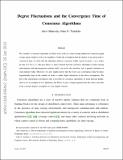Degree fluctuations and the convergence time of consensus algorithms
Author(s)
Tsitsiklis, John N.
DownloadTsitsiklis_Degree Fluctuations.pdf (686.6Kb)
OPEN_ACCESS_POLICY
Open Access Policy
Creative Commons Attribution-Noncommercial-Share Alike
Terms of use
Metadata
Show full item recordAbstract
We consider a consensus algorithm in which every node in a time-varying undirected connected graph assigns equal weight to each of its neighbors. Under the assumption that the degree of any given node is constant in time, we show that the algorithm achieves consensus within a given accuracy ∈ on n nodes in time O(n[superscript 3]ln(n=∈)). Because there is a direct relation between consensus algorithms in time-varying environments and inhomogeneous random walks, our result also translates into a general statement on such random walks. Moreover, we give simple proofs that the convergence time becomes exponentially large in the number of nodes n under slight relaxations of the above assumptions. We prove that exponential convergence time is possible for consensus algorithms on fixed directed graphs, and we use an example of Cao, Spielman, and Morse to give a simple argument that the same is possible if the constant degrees assumption is even slightly relaxed.
Date issued
2011-12Department
Massachusetts Institute of Technology. Department of Electrical Engineering and Computer ScienceJournal
Proceedings of the 50th IEEE Conference on Decision and Control and European Control Conference (CDC-ECC), 2011
Publisher
Institute of Electrical and Electronics Engineers (IEEE)
Citation
Olshevsky, Alex, and John N. Tsitsiklis. “Degree Fluctuations and the Convergence Time of Consensus Algorithms.” 50th IEEE Conference on Decision and Control and European Control Conference (CDC-ECC), 2011. 6602–6607.
Version: Author's final manuscript
ISBN
978-1-61284-799-3
978-1-61284-800-6
ISSN
0743-1546